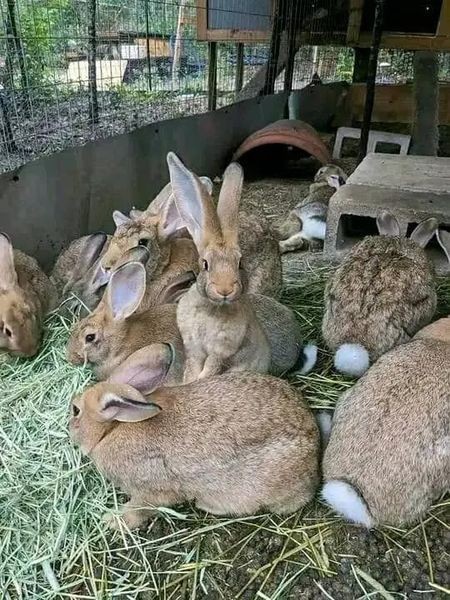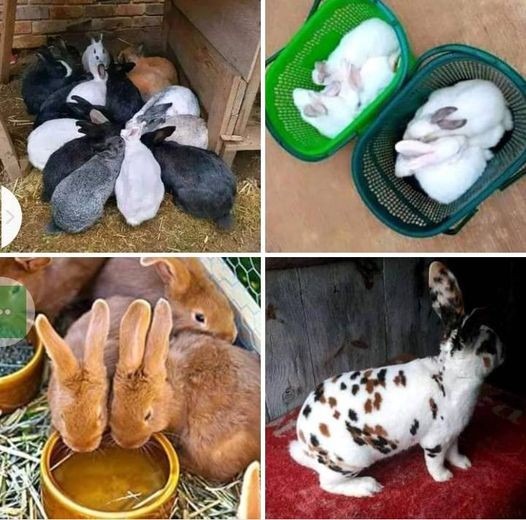🌿🐇🌿🐇🌿🐇🌿🐇🌿🐇🌿🐇🌿🐇🌿
🌿🐇🌿🐇🌿🐇🌿🐇🌿🐇🌿🐇🌿🐇🌿
🌿🐇🌿🐇🌿🐇🌿🐇🌿🐇🌿🐇🌿🐇🌿
🌿🐇🌿🐇🌿🐇🌿🐇🌿🐇🌿🐇🌿🐇🌿
✅✅✅BENEFITS OF RABBIT FARMING! 🐇 🐇 🐇
🥹Are you looking for a new venture in the agricultural world? Consider rabbit farming, also known as cuniculture, which offers numerous advantages:
🌿🐇🌿🐇🌿🐇🌿🐇🌿🐇🌿🐇🌿🐇🌿
💪💯1️⃣ High Reproduction Rate: A female rabbit, or doe, can have up to 12 babies per litter, with the average litter size being five to eight. Plus, rabbits can have multiple litters in a year, making them highly profitable!
🌿🐇🌿🐇🌿🐇🌿🐇🌿🐇🌿🐇🌿🐇🌿
💯💪2️⃣ Low Capital Investment: Start your rabbit farming journey without breaking the bank! Compared to other livestock farming, rabbit farming requires relatively low capital investment, making it an attractive option for small-scale farmers.
🌿🐇🌿🐇🌿🐇🌿🐇🌿🐇🌿🐇🌿🐇🌿
💪💯3️⃣ Low Feed Cost: Rabbits are herbivores and can thrive on a diet of hay, grass, and vegetation, which is easily accessible in most areas. This makes feeding rabbits cost-effective and budget-friendly.
🌿🐇🌿🐇🌿🐇🌿🐇🌿🐇🌿🐇🌿🐇🌿
💯💪4️⃣ High Nutritional Value: Looking for a healthy alternative to other meats? Rabbit meat is a rich source of protein, low in fat, and packed with vitamins and minerals, including iron and vitamin B12.
🌿🐇🌿🐇🌿🐇🌿🐇🌿🐇🌿🐇🌿🐇🌿
💪💯5️⃣ High Market Demand: Rabbit meat is gaining popularity worldwide due to its nutritional value, low-fat content, and delicious taste. As a rabbit farmer, you can tap into a growing market, both locally and internationally.
🌿🐇🌿🐇🌿🐇🌿🐇🌿🐇🌿🐇🌿🐇🌿
💯💪6️⃣ Environmentally Friendly: Join the movement towards sustainable farming! Rabbit farming is an environmentally friendly practice, as rabbits produce less waste and require less space and resources compared to other livestock.
🌿🐇🌿🐇🌿🐇🌿🐇🌿🐇🌿🐇🌿🐇🌿
💪💯7️⃣ Fertilizer Bonus: Get more out of rabbit farming! Rabbit manure is an excellent organic fertilizer, rich in nitrogen and phosphorus. It's a valuable byproduct that can enhance soil quality and boost crop yields.
🌿🐇🌿🐇🌿🐇🌿🐇🌿🐇🌿🐇🌿🐇🌿
🌿🐇🌿🐇🌿🐇🌿🐇🌿🐇🌿🐇🌿🐇🌿
🌿🐇🌿🐇🌿🐇🌿🐇🌿🐇🌿🐇🌿🐇🌿
🌿🐇🌿🐇🌿🐇🌿🐇🌿🐇🌿🐇🌿🐇🌿
🌿🐇🌿🐇🌿🐇🌿🐇🌿🐇🌿🐇🌿🐇🌿


Rabbit farming, also known as cuniculture, can offer numerous benefits, including:
1. High Reproduction Rate: Rabbits reproduce quickly and frequently. A single female rabbit can give birth to up to 8 kits in a litter, and can have multiple litters in a year, making them highly prolific.
2. Low Capital Investment: Compared to other types of livestock farming, rabbit farming requires relatively low capital investment to get started. This makes it an attractive option for small-scale farmers or those looking to diversify their farming operations.
3. Low Feed Cost: Rabbits are herbivores and can subsist on a diet of hay, grass, and other vegetation, which is readily available in most parts of the world. This means that the cost of feeding rabbits is low, making it a cost-effective farming option.
4. High Nutritional Value: Rabbit meat is a rich source of protein and is considered a healthy, low-fat alternative to other meats. It is also a good source of vitamins and minerals, such as iron and vitamin B12.
5. High Market Demand: There is a growing demand for rabbit meat in many parts of the world, due to its nutritional value, low fat content, and delicious taste. This means that there is a good market for rabbit farmers, both locally and internationally.
6. Environmentally Friendly: Rabbit farming is an environmentally friendly farming practice, as rabbits produce less waste than other types of livestock. They also require less space and resources, making them a sustainable farming option.
7. Fertilizer: Rabbit manure is an excellent organic fertilizer, rich in nitrogen and phosphorus. This makes it a valuable byproduct of rabbit farming, which can be used to improve soil quality and increase crop yields.

Essential Knowledge for Rabbit Farmers
Rabbit farming can be a rewarding venture, but it requires a good understanding of these key aspects:
✅1. Breeding and #reproduction
- Successful rabbit farming hinges on a solid grasp of breeding and reproduction. Understanding the breeding cycle, gestation period, and proper care for pregnant and nursing does is crucial for maintaining a healthy and productive rabbitry.
- It's essential to be knowledgeable about the process of kindling, the care of newborn kits, and the management of breeding bucks and does to ensure a sustainable and thriving rabbit farming operation.
✅2. #housing and #management
- Adequate housing and management practices are vital for the well-being of rabbits. Farmers must be well-versed in constructing suitable rabbit housing that provides comfort, protection from harsh weather, and ample space for the rabbits to move and exercise.
- Proper sanitation, ventilation, and disease prevention measures are also critical components of rabbit management that every farmer should be well-informed about to maintain a healthy and hygienic environment for the rabbits.
✅3. #nutrition and #feeding
- A comprehensive understanding of rabbit nutrition and feeding requirements is indispensable for successful rabbit farming. Farmers need to be knowledgeable about the dietary needs of rabbits at different stages of life, including the appropriate balance of hay, pellets, and fresh greens for optimal health and growth.
- Additionally, being aware of common nutritional deficiencies and health issues related to improper feeding is essential for maintaining the well-being of the rabbits and ensuring a productive farming operation.
These fundamental aspects of rabbit farming form the cornerstone of a successful and sustainable rabbitry, providing the foundation for a thriving and prosperous venture.
#breeding, #management
